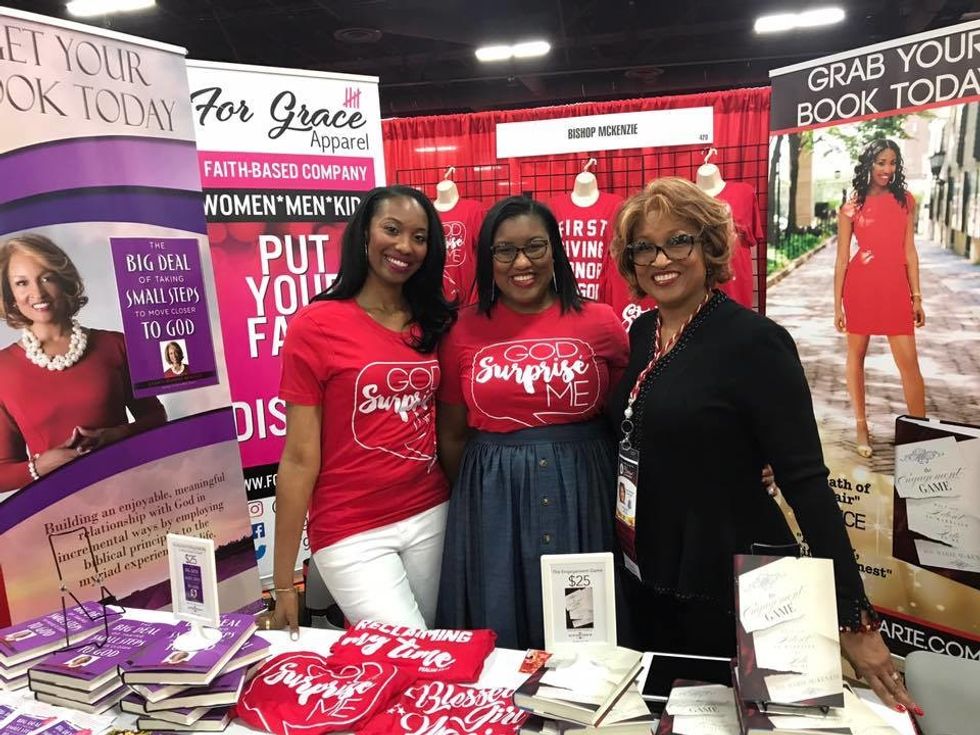
If you are a business owner with a product to sell, you've probably considered becoming a vendor as a marketing tool to make additional revenue. The personalized interaction you get with prospective clients and customers is essential for every business. Vending doesn't just look like a booth at a conference, and it's not just for people who sell jewelry or hair products.
Vending can come in the form of a conference buying your service or products for gift bags, pop-up activations, VIP lounges, or decor. On August 3, in partnership with Toyota Corolla, xoNecole is hosting our first-ever ElevateHER Crawl event in Atlanta, where black women business owners are encouraged to apply to become vendors in a mecca of black girl magic.
If you're curious about what it takes to become a vendor, we spoke to four women who know firsthand and shared their advice on making the most out of vending:
Why Vending May Work for You

Gwen Beloti, founder of women's apparel and accessories brand Gwen Beloti Collection
Courtesy of Gwen Beloti
Vending is a great way to supplement your online and purchase order sales or be a standalone side hustle. "It's also a chance to get feedback about your product. You get true, real, and live reactions. I think it's a great idea to invite people to share their thoughts on your items and to welcome the feedback," shared Gwen Beloti, founder of the women's wear brand of apparel and accessories Gwen Beloti Collection.
Beloti, who started her collection 2008, was hesitant to become a vendor and did not think it would be necessary for her business, but her thoughts about the process were proven wrong once she started vending in late 2018.
"There is so much value in the opportunity to tell your brand and product story to new people in a variety of settings. For a while, I found some comfort in hiding behind the laptop screen, but there is so much power in human connection," she shared.
Since she runs her clothing line as an e-commerce business without a brick and mortar, she has found vending to be a pleasant experience "to engage up close and personal" with customers at events, pop-ups, and markets.
Vend Where Your Audience Is
Understanding your audience and what events they are attracted to will help you decide what conferences, brunches, or panels align with your marketing strategy. Joi-Marie McKenzie, the author of The Engagement Game, suggests you "only vend where you have a personal connection with the audience, or believe you can build one. Otherwise, it may be wasted effort and time." Her most successful opportunities vending opportunities are those where there are black women are attending.
Shanae Jones, founder of the hip-hop inspired herbal tea company Ivy's Tea Co., ensures she is investing her marketing dollars in the right events by doing research, asking event organizers for attendee demographics and looking at past exhibitor companies. "Who was there last year? Are they a competitor or do we have some overlap in our customer segment(s)? Are they coming back?" are all questions she asks herself before exhibiting. She takes it a step further by reaching out to previous vendors regarding their experiences.
Leverage Speaking Engagements for Vending Opportunities

Joi-Marie McKenzie, author of 'The Engagement Game'
Courtesy of Joi-Marie McKenzie
As you begin to build your brand and gain momentum for your products or services as a speaker, utilize those opportunities to make sales by setting up a booth. For McKenzie, she leverages her speaking engagements into opportunities to sell her book. "There is no better way to sell your message, your product, and your book than connecting with people face to face. When you're interacting in person, not only do you share your message more fully and completely, you're able to connect better with your audience," she explained.
McKenzie asks event organizers if she can set up a table to sell her book before and after her speaking opportunity and finds this tactic to be helpful for book sales. "Most authors know that you don't have a lot of money on tour, but still I'd invest in book stands, Square card readers so you're able to accept electronic payments, a nice table cloth and a pop-up sign, which you can buy for as low as $99," she shared.
Product Placement is a Form of Vending

Lashae Bey, founder and creator of Lotti Belle Beauty
Courtesy of Lashae Bey
Lashae Bey, founder and creator of Lotti Belle Beauty, said that her vending experience has come in the form of product placement in gift bags and activations. The eco-friendly and organic beauty products was a vendor for Blavity's Summit 21 beauty store, Chateau 21. The pop-up experience gives attendees access to beauty products where they can select five complimentary items to take home with them.
Bey also sponsored Karen Civil's 7th Annual Live Civil Brunch by sponsoring product for the gift bags. Her opportunities to vend vary as some companies reach out to her while other she pitches with a partnership marketing deck and product pitch deck to share with companies. "If I feel it's a good fit for me and I can expand my visibility to a new market, I'll consider it. When I first started my company Lotti Belle Beauty [in] November 2017, I knew my goal was to do 1-2 sponsorship collaborations per year. That meant either donating my products to go inside gift bags or vending for special events," she explained.
Make Sure to Cover Vendor Costs
Before you become a vendor, you have to understand the costs that some opportunities will bring. Budgeting for vendor booth costs and other fees will allow you to make goals to hit profit or recover the investments you prepared to participate in the event. Jones estimates what she will make before investing in a vendor opportunity. She cuts the expected attendee amount by half, then considers how many items she's likely to sell considering the demographics, which lets her know how much product to bring. "Factor in travel expenses, lodging, food, and miscellaneous expenses and you're not likely to make a ton of money unless the event is very close to home for you," she advised.
McKenzie learned through experience that some conferences and events require insurance to sell. "It's typically not expensive (no more than $150), but it should be added into your budget."
Bey learned that you need a plan A, B, and C when it comes to vending your products. "Shipping constraints when shipping large bulk orders and factoring in the cost for damaged or lost items. Also, having a great assistant or someone to help you during the day is a bonus, too."
Make Your Presence Known at the Conference

Joi-Marie McKenzie at one of her booths while vending at an event
Courtesy of Joi-Marie McKenzie
If you want people to visit your booth and buy from you, then you have to let it be known that you are at an event. Start by using social media to let your followers know you will be attending and vending at an event. Promote this information on your website as well as your mailing list. While on site, you may have to do more than just man your booth. According to McKenzie, to be a successful vendor, you should never be sitting down.
"You may have to go out and get customers. If you're walking around the event or conference, pass out fliers or bookmarks to reach your audience even further. Vending is not for the faint at heart; it's for the seller," she explained.
At events, people will pass by your table even if it looks interesting, but what draws them in is an engaging seller. "Speak to every single person who walks by, even if they don't speak back. Very few people are going to stop by your table overly eager to buy whatever you're selling, but if you are nice and welcoming and engage them, you can turn that person from a looker into a buyer," shared Jones.
Beloti believes knowing what type of space you will be utilizing at the event is essential for managing your displays. "With this information, I can then spend time making sure that my display and inventory is conducive to the structure of the event," she shared.
Her favorite set-ups are the ones where she is given the space and freedom to curate her mini boutique. "Curating your display is super important, probably the part I enjoy the most. It should be representative of your brand aesthetic. Working within the parameters of the space given, I want to showcase my brand in the best way possible," Beloti said.
Be Direct in Your Sale
Early in McKenzie's experience, she lost out on book sales because she forgot to be direct in asking for a purchase. She started incorporating her ask in her pitch to seal the deal: "So do you want to take a book home?"
She had to get comfortable saying that and asking visitors if they'd like to take two books home. "You'd be surprised at how many people said, 'You know what? Sure! Let me get one for my sister, or cousin, or line sister.'"
Prepare to Sell After the Event

Shanae Jones, founder of Ivy's Tea Co.
Courtesy of Shanae Jones
A high touch business is one that maintains a relationship with its customers whereby the customer can reach a member of the staff anytime. "For Ivy's Tea Co. that means, my staff or myself respond to every email, every comment, every DM, and engages with our supporters all the time," Jones revealed.
Taking that experience into an in-person market helps strengthen her brand with consumers. "I think more businesses should treat vending like a marketing tool and not an in-store pop-up. Always have your sign up sheets or iPad ready to get email addresses. This is what you want for future contact and sales," she continued.
So are you ready to be a vendor? Apply to become one at xoNecole's first annual ElevateHER Crawl in Atlanta by clicking here.
Featured image by Getty Images
Exclusive: Viral It Girl Kayla Nicole Is Reclaiming The Mic—And The Narrative
It’s nice to have a podcast when you’re constantly trending online. One week after setting timelines ablaze on Halloween, Kayla Nicole released an episode of her Dear Media pop culture podcast, The Pre-Game, where she took listeners behind the scenes of her viral costume.
The 34-year-old had been torn between dressing up as Beyoncé or Toni Braxton, she says in the episode. She couldn’t decide which version of Bey she’d be, though. Two days before the holiday, she locked in her choice, filming a short recreation of Braxton’s “He Wasn’t Man Enough for Me” music video that has since garnered nearly 6.5M views on TikTok.
Kayla Nicole says she wore a dress that was once worn by Braxton herself for the Halloween costume. “It’s not a secret Toni is more on the petite side. I’m obsessed with all 5’2” of her,” she tells xoNecole via email. “But I’m 5’10'' and not missing any meals, honey, so to my surprise, when I got the dress and it actually fit, I knew it was destiny.”
The episode was the perfect way for the multihyphenate to take control of her own narrative. By addressing the viral moment on her own platform, she was able to stir the conversation and keep the focus on her adoration for Braxton, an artist she says she grew up listening to and who still makes her most-played playlist every year. Elsewhere, she likely would’ve received questions about whether or not the costume was a subliminal aimed at her ex-boyfriend and his pop star fiancée. “I think that people will try to project their own narratives, right?” she said, hinting at this in the episode. “But, for me personally – I think it’s very important to say this in this moment – I’m not in the business of tearing other women down. I’m in the business of celebrating them.”
Kayla Nicole is among xoNecole’s It Girl 100 Class of 2025, powered by SheaMoisture, recognized in the Viral Voices category for her work in media and the trends she sets on our timelines, all while prioritizing her own mental and physical health. As she puts it: “Yes, I’m curating conversations on my podcast The Pre-Game, and cultivating community with my wellness brand Tribe Therepē.”
Despite being the frequent topic of conversation online, Kayla Nicole says she’s learning to take advantage of her growing social media platform without becoming consumed by it. “I refuse to let the internet consume me. It’s supposed to be a resource and tool for connection, so if it becomes anything beyond that I will log out,” she says.
On The Pre-Game, which launched earlier this year, she has positioned herself as listeners “homegirl.” “There’s definitely a delicate dance between being genuine and oversharing, and I’ve had to learn that the hard way. Now I share from a place of reflection, not reaction,” she says. “If it can help someone feel seen or less alone, I’ll talk about it within reason. But I’ve certainly learned to protect parts of my life that I cherish most. I share what serves connection but doesn’t cost me peace.
"I refuse to let the internet consume me. It’s supposed to be a resource and tool for connection, so if it becomes anything beyond that I will log out."

Credit: Malcolm Roberson
Throughout each episode, she sips a cocktail and addresses trending topics (even when they involve herself). It’s a platform the Pepperdine University alumnus has been preparing to have since she graduated with a degree in broadcast journalism, with a concentration in political science.
“I just knew I was going to end up on a local news network at the head anchor table, breaking high speed chases, and tossing it to the weather girl,” she says. Instead, she ended up working as an assistant at TMZ before covering sports as a freelance reporter. (She’s said she didn’t work for ESPN, despite previous reports saying otherwise.) The Pre-Game combines her love for pop culture and sports in a way that once felt inaccessible to her in traditional media.
She’s not just a podcaster, though. When she’s not behind the mic, taking acting classes or making her New York Fashion Week debut, Kayla Nicole is also busy elevating her wellness brand Tribe Therepē, where she shares her workouts and the workout equipment that helps her look chic while staying fit. She says the brand will add apparel to its line up in early 2026.
“Tribe Therepē has evolved into exactly what I have always envisioned. A community of women who care about being fit not just for the aesthetic, but for their mental and emotional well-being too. It’s grounded. It’s feminine. It’s strong,” she says. “And honestly, it's a reflection of where I am in my life right now. I feel so damn good - mentally, emotionally, and physically. And I am grateful to be in a space where I can pour that love and light back into the community that continues to pour into me.”
Tap into the full It Girl 100 Class of 2025 and meet all the women changing game this year and beyond. See the full list here.
Featured image by Malcolm Roberson
There is a very specific reason why I decided to write this article before the holiday season officially gets underway. It’s because I once read a study that said it’s quite common for most Americans to double the amount of alcohol that they consume between Thanksgiving and New Year’s Day.
It makes sense when you stop to think about all of the holiday parties, time off, and moments spent with loved ones that transpire around this time of year. And while there is certainly nothing wrong with enjoying some mulled wine, real-deal eggnog, or peppermint martinis, because your health is something that never “takes a vacation,” I thought it was important to share with you some of the benefits (pros) and challenges (cons) that can arise from alcohol consumption.
My main motive? Mostly, I hope that it will serve as a solid reminder to embrace all of the things that you adore about this time of year, so long as you do it in moderation and you weigh the costs.
Especially as far as drinking alcohol is concerned.
PRO: Manages Blood Sugar Levels
 Giphy
GiphyHere’s something that you may have never seen coming. Were you aware of the fact that alcohol can actually help to stabilize your blood sugar? Yep, according to the American Diabetes Association, so long as you leave it to no more than 1-2 cocktails a day, alcohol may be able to lower your A1C levels. Pretty cool, right?
CON: It’s a Carcinogen
 Giphy
GiphyAlcohol is a carcinogen. The reason why this should somewhat alarm you is because carcinogens are things (like tobacco, UV rays, processed meats, etc.) that can increase your chances of being diagnosed with cancer (especially mouth, throat, esophagus, stomach and breast cancer). There are various ways this happens including the fact that alcohol, specifically, can hinder your body from breaking down certain nutrients, it can cause your estrogen levels to spike and alcohol can also cause certain toxins to damage your DNA and certain bodily proteins over time.
PRO: Cultivates Euphoric Feelings
 Giphy
GiphyIf you find yourself feeling more euphoric while you’re enjoying a drink, it’s not all up in your head. Although, for the more part, alcohol is considered to be a depressant, when consumed in small amounts, it can provide a stimulant effect. This happens due to the fact that when you first start to consume alcohol, it causes the production of the feel-good hormone known as dopamine to increase — and since dopamine makes us all feel more relaxed and confident while heightening our senses of pleasure too…well, there you have it.
CON: May Increase Anxiety/Depression
 Giphy
GiphyAs they say, “what goes up, most come down” at some point — and that is what you have to be careful of when it comes to alcohol consumption. For instance, when you drink alcohol, although it tends to initially cause your dopamine levels to uptick, because it is a temporary bodily response, sometimes the dips are lower than the rises…and that is when anxiety starts to kick in. A similar point is made with depression because oftentimes, people with depression-related symptoms, will use alcohol as a way to deflect from what’s really going on with them — and that can make them feel even worse than ever once the buzz of alcohol starts to wear off.
PRO: Has Some Heart-Related Benefits
 Giphy
GiphyWhen it comes to your heart, there are interesting findings surrounding its relationship to alcohol. For instance, some research states that, so long as the consumption is moderate, alcohol can actually help to increase the good cholesterol in your system while also breaking down proteins that can potentially lead to blood clots; both of these factors alone can reduce your chances of dying from heart disease.
CON: Packs on Pounds
 Giphy
GiphyIt’s no secret that alcohol tends to contain quite a few calories. That’s why, it’s not uncommon for people who’ve lost weight to mention “I’ve stopped drinking” as one of the causes for the shed pounds. That’s not to say that there aren’t some alcoholic beverages that have less calories than others including vodka (133 calories per serving), white wine (148 calories per serving) and tequila (99 calories per shot). Just keep in mind that the more you drink, the more calories get into your system and the more weight you stand to gain.
PRO: Lowers Inhibitions
 Giphy
GiphyAlthough you really should only be uninhibited around people who you absolutely trust, if that person is your partner and you’re looking to have a pretty — eh hem — active evening, alcohol can certainly help to make that happen. The science of it all is the prefrontal cortex of your brain is what regulates your inhibitions and levels of self-control. Meanwhile, alcohol suppresses your inhibitions which can cause you to be more spontaneous and open to trying things that you might not immediately do if you were sober. And with the right individual, that can be sexually beneficial (emphasis on “right person”).
CON: Makes It Harder to Orgasm
 Giphy
GiphyOn the other hand, as odd as it may seem (in light of what I just said), if you have too much alcohol in your system, it could make climaxing difficult. That’s because orgasms happen, in part, due to your nervous system being stimulated — and since alcohol is technically a depressant…well, it could reduce nerve sensitivity (especially as far as your clitoris goes) for you while making it challenging for your partner to remain erect or have consistent stamina. And yeah, that sucks.
____
‘Tis the season. And with that, if some wassails or hot buttered rums are in your immediate future — hey, don’t let me stop you — not even a lil’ bit.
All I’m saying is now that you know what alcoholic drinks have to offer (both ways), you can know exactly how to incorporate them into your holiday plans. Enjoy!
Let’s make things inbox official! Sign up for the xoNecole newsletter for love, wellness, career, and exclusive content delivered straight to your inbox.
Featured image by Unsplash









